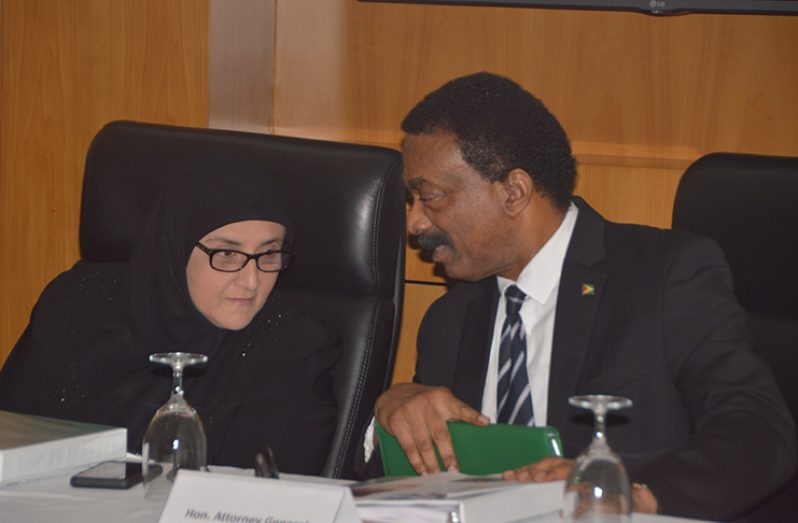-AG stresses need for laws to prosecute, investigate money laundering
IN the absence of accountability and transparency, the oil and gas sector could become a breeding ground for corruption and money laundering, said Attorney General (AG), Basil Williams, adding that now more than ever, laws need to be used effectively to investigate and prosecute money laundering.
Money laundering poses a serious problem for emerging markets such as Guyana, which is transitioning to an oil economy.
“As such, we must take combatting money laundering seriously so that all Guyanese can benefit from this emerging sector… the impending oil and gas sector will significantly boost our economy and this must be used to contribute substantially to the sustained social and economic development,” said Williams during his remarks at a two-day training programme, which was organised by the National Centre for State Courts (NCSC) for prosecutors and law enforcement agencies, at the Marriot Hotel on Thursday.

Management of the sector will ensure that revenue earned goes toward supporting areas such as education, healthcare, infrastructure and economic diversification.
In order to ensure that there is success in the sector, the AG said asset recovery would be an important tool because it deters people and companies from engaging in money laundering activities by reducing money/assets, which criminals can receive from criminal activity.
He believes that it disrupts criminal networks and markets by removing the capital needed for future criminality; it improves crime detection by providing a deeper understanding of criminal markets; and generates significant revenue for the country.
“Money laundering has a devastating effect on the economy, security and social development of any country,” said Williams, noting that failure to properly investigate and prosecute money laundering will result in the risk of losing vital correspondent banking relationships, which are especially important for small countries with small financial systems like Guyana.
The training sessions were recognised as an opportunity to bring together investigators, prosecutors and other relevant persons, so that they can enhance their capacity to investigate and prosecute money laundering.
The areas of money laundering and asset recovery are critically important to the Government of Guyana because if the issue is not addressed, the results lead to the erosion of the integrity of our financial institutions, developmental policies and moral fabric of society.
According to Williams, in 2022 the Mutual Evaluation Report of Guyana will be presented at the Caribbean Action Task Force (CFATF) Plenary.
This report will state how Guyana measures up against the Financial Action Task Force (FATF) 40 recommendations and 11 immediate outcomes.
He said, not only will Guyana be required to have the requisite legislation and policy in place, but also demonstrate that the country can effectively combat money laundering, terrorism financing and proliferation financing.
“It is quite clear that we face challenges in detecting, investigating and prosecuting money laundering and confiscating the proceeds of crime. Some of these challenges relate to expertise and resource issues; interpretation and effective use of our laws by the relevant agencies and effective sharing of information,” said the attorney general, noting that it is important that those challenges be addressed and that Guyana is equipped to fight against money laundering.
Failure to effectively combat money laundering means that drug dealers, terrorists, illegal arms dealers, corrupt public officials and others, will continue to expand their criminal enterprises.
Money laundering is a transnational crime which also affects international security. It is for these reasons that the government has increased its efforts to combat money laundering and at the same time, implement measures to tackle corruption.
“Targeting corruption is important as it complements money laundering. Not only is corruption a predicate offence to money laundering, it is also an impediment to the implementation of counter measures against money laundering,” he said.
In light of this, Williams believes that law enforcement should make it a policy objective to use asset recovery as a means to combat money laundering and corruption.
Through the Anti-Money Laundering and Countering the Financing of Terrorism Act, government is able to freeze and confiscate assets both criminally and civilly.
MUCH MORE
“However much more needs to be done. Successful asset recovery requires effective investigations and prosecutions and therefore we need to continue building capacity…we have to be more proactive by seeking international cooperation through mutual legal assistance and partnering with agencies such as INTERPOL, ARIN-CARIB and other FIUS to assist in investigating and prosecuting money laundering and related predicate offences,” said Williams.
Director of Public Prosecutions (DPP), Shalimar Ali-Hack echoed similar sentiments, noting that investigating some money laundering cases are complex but sensitisation would improve the abilities of the prosecutors and investigators.
The training programme for prosecutors and law enforcement agencies was designed to promote best practices in the successful investigation and prosecution of money laundering cases.
Attendees will gain invaluable insights into criminal enterprises that cloak illegal proceeds through financial transactions, and purchase of assets to convey legitimacy.
The programme will also focus on best approaches to asset forfeiture, including managing and disposing of assets through criminal and or civil proceedings.
The workshop faculty is comprised of highly experienced prosecutors, investigators and legal analysts.
The team of experts from the US and Eastern Caribbean will also demonstrate the need for collaboration among law enforcement agencies, prosecution offices and financial institutions, while providing a comprehensive overview of the legal frameworks utilised in unraveling webs of criminal activities that are national and transnational in nature.



.jpg)








